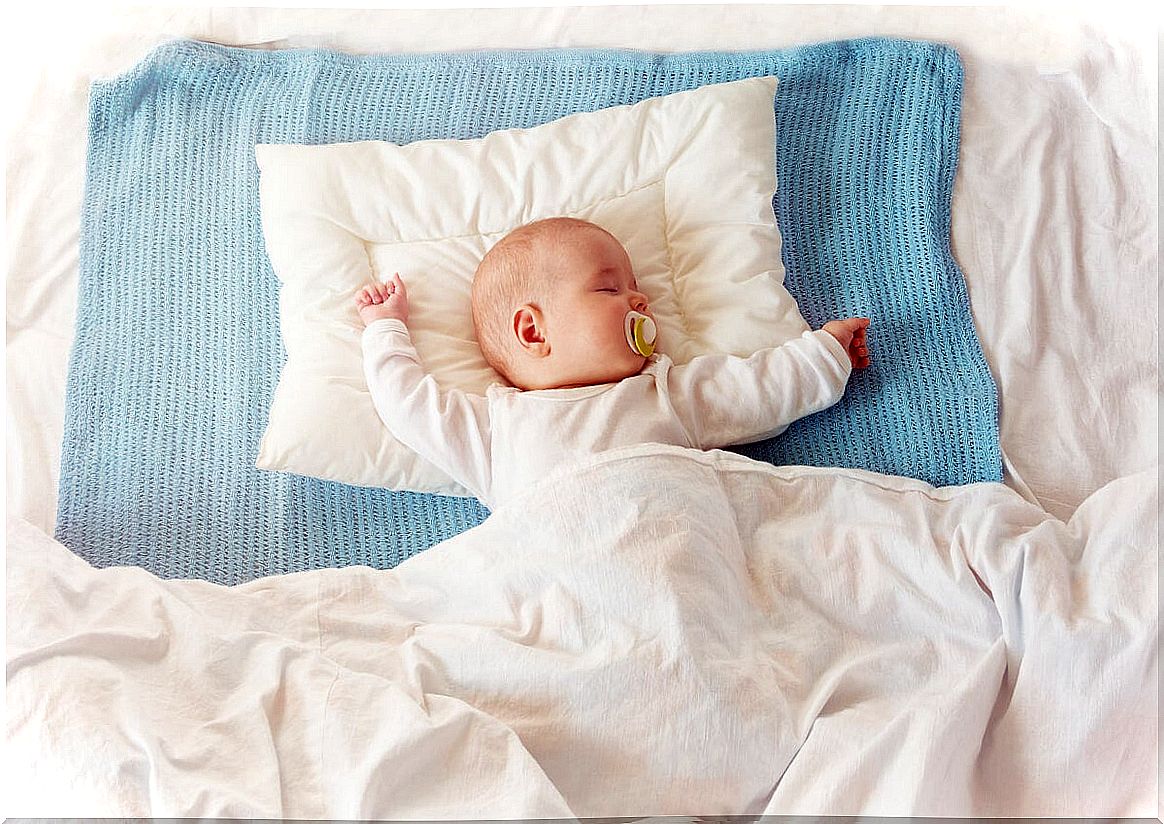Sleep In Babies

Sleep in babies has completely different patterns than at any other age. This can be a bit puzzling for parents, especially if they are new. They will wonder if the little one is sleeping well, if it is normal for him to wake up so many times in the night, if this or the other.
The usual thing is that there is an army of aunts and friends who are giving all kinds of advice on what you should do or not do. So the picture can get very confusing, which is why it is worth clarifying some basic points about sleep in babies. Let’s see.

How much should the baby sleep?
This is one of the first questions that assail parents. Sleep patterns in babies change rapidly, so there will be several new developments throughout the process. Although each baby is different, the usual is that the hours of sleep are distributed as follows:
- Newborn: 16 to 20 hours a day.
- 3 weeks: 16 to 18 hours a day.
- 6 weeks: 15 to 16 hours a day.
- 4 months: 9 to 12 hours plus two naps, 2 to 3 hours each.
- 6 months: 11 hours plus two naps, 2 to 3 hours each.
- 9 months: 11 to 12 hours plus two naps, 1 to 2 hours each.
- 1 year: 10-11 hours plus two naps, 1-2 hours each.
- 18 months: 13 hours plus one or two naps, 1 to 2 hours each.
- 2 years: 11 to 12 hours plus a 2 hour nap.
- 3 years: 10 to 11 hours plus a 2 hour nap.
Sleep in babies at night
This is one of the great concerns of parents, who must get used to the fact that they themselves will not be able to sleep long for a long time. The first thing you should know is that the normal sleep cycle in an adult has five phases. In contrast, sleep in babies has only two.
That is why babies wake up frequently at night: they complete their deep sleep cycle very quickly and are therefore ready to eat very quickly. Therefore, you should not worry about waking up many times during the night ; what you should do is prepare yourself mentally and emotionally for this stage.
From what has been said, it is clear that you do not have to “teach him to sleep” or try to instill different sleep patterns before 8 months. He alone will change and learn to sleep in a more continuous way.
Is there a way to reduce nighttime awakenings?
Yes, there is a way to reduce nighttime awakenings, although not to avoid them, as we have already said. Some mothers think that if they do not allow the baby to sleep during the day or limit his number of naps, they will then get him to sleep long through the night. This is not true and, in fact, acting on this idea can have the opposite effect.
If the baby has not had enough sleep during the day, he will be more nervous and restless at night. So you may not have a peaceful sleep and wake up more times. Therefore, try not to limit your daytime rest: let everything flow naturally.
One of the things that helps make the baby’s sleep a little more regular is practicing co-sleeping, that is, sleeping with the little one. He wakes up during the night basically looking for food. So, if you are around him and you breastfeed him, he will most likely remain very calm, in a navel sleep, and also let others rest.

Other guidelines to keep in mind
So that the baby’s sleep is gradually regularizing, it is convenient that you expose it to light and noise during the day. On the other hand, at night it is convenient to lower the lights and keep quiet. This will help the child’s biological clock to synchronize little by little.
Babies fall asleep better if they are well clothed and sung or played soothing music. After 3 months, it is good to put them to bed before they are completely asleep; thus they learn to sleep alone. On the other hand, when the baby wakes up at night to ask for food, do not turn on the lights and try to make a minimum of noise. Don’t entertain or talk to your baby at night. It is good to establish a fixed, relaxing and enjoyable routine before going to bed.









